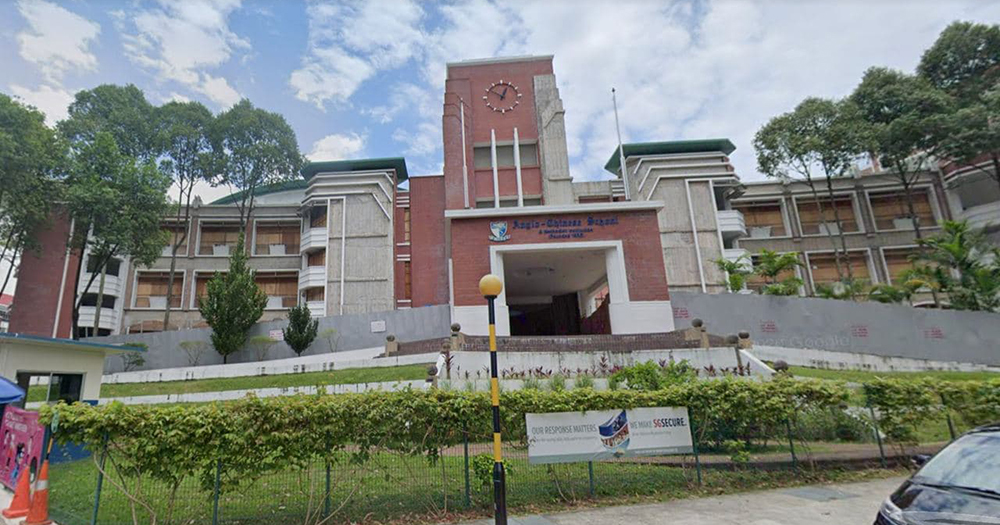For the Anglo-Chinese School (ACS) to carry on the mission of its founder, Bishop William Fitzjames Oldham, it needs to open its doors to those who are outside of the community it is "comfortable" with, the ACS group's management wrote in a letter to alumni.
The internal letter, seen by Mothership, was circulated on Feb. 9, the same day that the Ministry of Education (MOE) announced ACS Primary [ACS(P)] is being relocated to Tengah and will become a co-educational school.
The management added, "Some of you may understandably feel that this is a break from our tradition where ACS has primarily been a boys school."
They also acknowledged how "overwhelming" such changes could be to both current and future students, as well as alumni and parents.
The letter stated:
"For many, the ACS name is more than an educational institute - it is an identity, a foundation of our lives, and it is family. Being a member of the ACS family carries a sense of pride that is unmatched, and we want this pride to be retained for years to come."
The letter was signed by the Bishop of The Methodist Church in Singapore, Gordon Wong, the Chairman of the ACS Board of Governors, Richard Seow, and the President of the ACS Old Boys' Association, Lock Wai Han.
ACS wanted to explore serving heartland communities and making its P1 intake more diverse
The management elaborated that the decision behind ACS Primary's relocation to Tengah town and going co-ed is the result of a year-long discussion between members of the ACS board of governors, the Ministry of Education (MOE) and "selected government leaders".
The management added they had expressed their desire to explore how ACS could "better serve the needs of the community in the heartlands" and "inject more diversity" into the student profile of ACS, especially at the Primary 1 intake.
"The motivation underpinning this desire is clear", the management said, highlighting that the school's founder, Oldham, established ACS in 1886 to provide education to an "under-served" community — local children.
The move to Tengah is to therefore strengthen ACS's commitment to its founding principles, missions and values.
In addition, the move will provide the opportunity to expand the "ACS family" to a new residential estate, which is likely to have a "diverse" population comprising people from various socioeconomic, ethnic and religious backgrounds.
"To that end, we strengthen our commitment to Bishop Oldham’s mission of serving the community and the nation by bringing quality education to a wider cross-section of society," the management stated.
Move to co-educational status will benefit daughters of ACS(P) alumni
The letter also described the shift to co-educational status as an opportunity to expand the ACS education and family to a new group of students.
"A greater number of ACS(P) alumni will then be able to benefit as their daughters will now have access to an ACS education," the management pointed out.
In explaining the school's history, the management elaborated that ACS had set out to be a boys school from the beginning as it was uncommon for girls in Singapore to have a formal education in 1886 and the early 1900s — hence Oldham's focus on boys from the onset of the first enrolment.
ACS has also progressively welcomed female students over the years into its family of schools.
The management further wrote:
"Even before the Anglo Chinese Junior College (ACJC) was set-up, our pre-university classes had female students. Today, besides ACJC, we have female students at ACS (International) and ACS (Independent). So it is not uncommon now to have the daughters of our alumni also enjoy the same privileges we have accorded our boys, as well as welcome the wider female population in Singapore."
Current students at ACS(P) will not be affected
With regard to students currently studying at the Barker Road site of ACS(P), the management highlighted that the move will not affect them as MOE will apply a “teach-out” model to allow existing students already enrolled in ACS(P) to remain until graduation in Primary 6.
This will also apply to ACS(P) cohorts that will be admitted until 2029.
MOE will allow ACS(P) at Barker Road to continue to admit younger male siblings for Primary 1 from 2030 onwards, provided that they have an older sibling still studying at ACS(P) at Barker Road.
At the same time, both male and female siblings of existing students of ACS(P) at Barker Road will be eligible for Phase 1 priority for Primary 1 admission at ACS(P) at Tengah.
As a result of this shift, ACS(P) at Barker Road would see decreasing Primary 1 intakes from 2030 onwards.
MOE's plan is for ACS(P) at Barker Road to consolidate with ACS (Junior) at Winstedt Road tentatively in 2033, and will operate from both campuses before eventually combining at the Barker campus tentatively in 2039.
Screenshot via Google Streetview
If you like what you read, follow us on Facebook, Instagram, Twitter and Telegram to get the latest updates.
